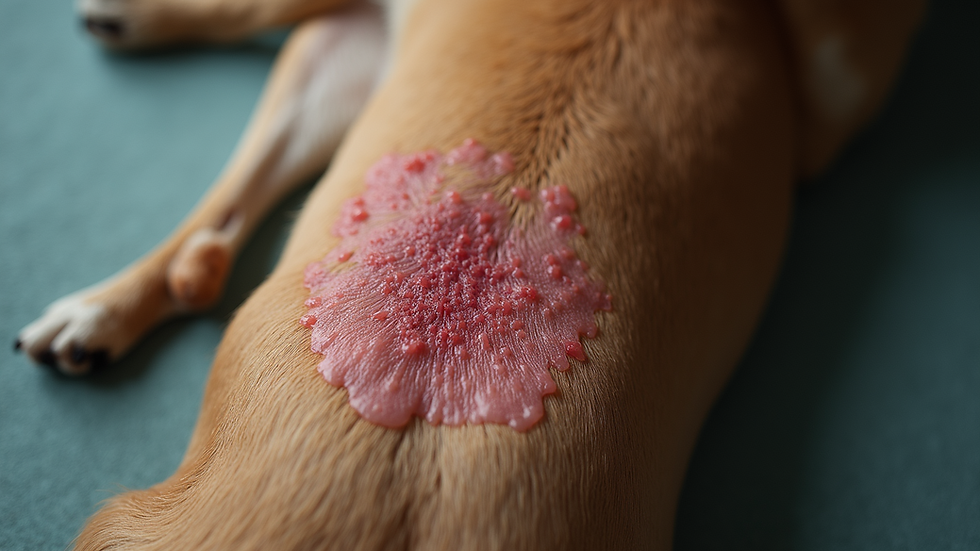Understanding Skin Disease in Pets - The ITCH!!
- Dr Mandy Lugsdin
- Jul 23, 2025
- 4 min read
Updated: Sep 8, 2025
When it comes to our beloved furry companions, their health is often a top priority. One common issue that pet owners may encounter is skin disease. Skin issues can affect pets of all breeds and sizes, causing discomfort and distress. In this post, we'll explore some of the most prevalent skin diseases in pets, their symptoms, causes, treatment options, and essential tips for prevention and early detection.
Common Skin Diseases in Pets
Pets can suffer from various skin ailments, each with its own unique set of symptoms and underlying causes.
Allergies
Allergies are one of the leading causes of skin problems in pets. They can be triggered by environmental factors like pollen, dust mites, or certain foods.
Symptoms:
Itching and scratching
Red, inflamed skin
Hot spots or lesions
Hair loss
Causes:
Allergies occur when a pet's immune system reacts to a normally harmless substance. The most common allergens include grasses, pollen, dust, and certain foods.
Treatment Options:
Treatment often involves identifying the allergen and minimizing exposure. Antihistamines, corticosteroids, and medicated shampoos may help alleviate symptoms. In severe cases, allergy testing and immunotherapy might be recommended.

Flea Infestations
Fleas are another frequent cause of skin irritations in pets. These tiny parasites feed on pet blood and can lead to severe allergic reactions in some animals.
Symptoms:
Intense itching and scratching
Red, irritated skin
Small black specks in fur (flea dirt)
An especially itchy spot at the tail base
Sometimes you will not a flea on your pet - especially on cats as they are so clever at picking them off!
Causes:
Pets can become infested through contact with other animals or their environment. Flea bites can lead to dermatitis (skin infection), a condition that exacerbates skin irritation.
Treatment Options:
Effective flea control involves using veterinary-approved flea treatments and maintaining a clean living environment. Flea prevention is crucial during warmer months when these pests are most active.

Dermatitis
Dermatitis refers to the inflammation of the skin and is often categorized into contact dermatitis, atopic dermatitis, and seborrhea.
Symptoms:
Redness or rash
Scaly skin
Pus-filled lesions
Oozing or crusting
Causes:
It can be caused by allergies, environmental irritants, or even parasites. Atopic dermatitis is hereditary and often occurs with seasonal allergies.
Treatment Options:
Treating dermatitis often involves topical applications, oral medications for inflammation, and identifying and avoiding triggers. In some cases, medicated shampoos can assist in alleviating symptoms.

Fungal Infections
Fungal infections, such as ringworm, can lead to significant skin problems and are often highly contagious.
Symptoms:
Patches of hair loss
Red, scaly, and itchy skin
Crusty scabs
Causes:
Fungal infections typically result from contact with infected animals or contaminated environmental sources.
Treatment Options:
Treatment includes antifungal medications and managing contaminated areas. It's essential to keep your pet isolated during treatment to prevent spreading the infection.
Bacterial Infections
Bacterial infections can occur when bacteria invade skin that has been damaged, leading to conditions such as pyoderma.
Symptoms:
Pus-filled bumps or lesions
Redness and swelling
Foul odor
Causes:
Underlying conditions like allergies or flea infestations can lead to skin injuries, providing an environment for bacteria to thrive.
Treatment Options:
Veterinarians may prescribe antibiotics to eliminate the bacteria and suggest medicated shampoos to soothe the skin.
Tips for Prevention
Preventing skin diseases in pets revolves around routine care and attention to their environment. Here are some practical tips:
Regular Grooming: Regularly brush your pet's coat to remove loose fur and debris. This helps reduce allergens and prevents matting that can lead to skin infections.
Bathing: Bathe your pet with a gentle, vet-recommended shampoo that caters to their specific skin needs. Overbathing can strip oils from their skin, so consult your veterinarian for a bathing schedule.
Healthy Diet: Ensure your pet's diet is balanced and nourishing. High-quality food with Omega fatty acids can promote healthy skin and coat.
Regular Vet Check-ups: Routine veterinary visits are essential for early detection of skin issues. Ensure that your pet is current on vaccinations and flea/tick preventatives.
Environmental Control: Keep your pet's living space clean and free of allergens. Frequent carpet cleaning and using air purifiers can help reduce the presence of allergens in your home.
Importance of Early Detection
Early detection of skin diseases is critical for effective treatment. If you notice any changes in your pet’s skin or behavior, seek veterinary care promptly. Catching conditions early can prevent more severe complications down the line.
Monitoring your pet regularly can empower you to recognize symptoms and act quickly. This includes checking for unusual lumps, excessive scratching, and changes in coat appearance. Remember, your veterinarian is your best ally in keeping your pet healthy and happy.
Caring for Your Pet’s Skin
As conscientious pet owners, it’s important to prioritize the skin health of our furry friends. Remember, early intervention is key when it comes to treating skin diseases. If you ever have concerns, do not hesitate to reach out to a compassionate veterinarian who can offer thorough expertise and guidance.
Additionally, always be mindful of new products or treatments you introduce into your pet’s routine. When in doubt, consult your veterinarian for recommendations tailored to your pet’s needs.
Emphasizing skin health can significantly improve your pet’s overall quality of life. By understanding the common skin diseases, their symptoms, causes, and appropriate treatments, you are taking a significant step towards better care for your beloved companion.
Let’s create a healthier future for our pets, one that ensures they can lead happy and comfortable lives. Keep an eye out for any abnormalities, and have faith in the power of preventative care!







Comments